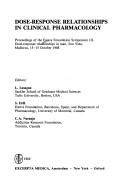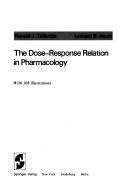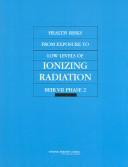| Listing 1 - 10 of 308 | << page >> |
Sort by
|
Book
Year: 2015 Publisher: Oslo : Norwegian Knowledge Centre for the Health Services (Nasjonalt kunnskapssenter for helsetjenesten),
Abstract | Keywords | Export | Availability | Bookmark
 Loading...
Loading...Choose an application
- Reference Manager
- EndNote
- RefWorks (Direct export to RefWorks)
In Norway, naltrexone is approved as supportive treatment of alcohol dependence. The recommended dose is 50 mg, equivalent to the marketed tablet. Naltrexone in much lower doses than 50 mg has been used in Norway for the treatment of a variety of diseases, such as multiple sclerosis (MS), Crohn's disease, fibromyalgia, cancer, inflammatory bowel disease, chronic fatigue syndrome, and amyotrophic lateral sclerosis. Doses of 3 to 5 mg per day have often been termed low dose naltrexone. This use is beyond the approved indication. The purpose of this report is to examine whether there is a documented effect of the use of naltrexone in low doses. We summarized data from a systematic review and several randomized controlled and prospective controlled studies in order to investigate the effect of using naltrexone in low doses on illness, and on functioning in daily life and to examine the risk of side effects. We identified studies for people with:1. Crohn's disease (one systematic review, two studies) 2. multiple sclerosis (two studies) 3. fibromyalgia (two studies) 4. cancer (one study) 5. HIV (one study) 6. various pain conditions (three studies) 7. opioid dependence (six studies) All studies were either small, of short duration, or had other methodological limitations. We considered the documentation to have very low quality. That means that we cannot conclude whether the use of naltrexone in low doses is effective or safe.
Periodical
Year: 2012 Publisher: Bethesda, MD : National Institute of Diabetes and Digestive and Kidney Diseases,
Abstract | Keywords | Export | Availability | Bookmark
 Loading...
Loading...Choose an application
- Reference Manager
- EndNote
- RefWorks (Direct export to RefWorks)
Periodical
Year: 2012 Publisher: Bethesda, MD : National Institute of Diabetes and Digestive and Kidney Diseases,
Abstract | Keywords | Export | Availability | Bookmark
 Loading...
Loading...Choose an application
- Reference Manager
- EndNote
- RefWorks (Direct export to RefWorks)
Book
Year: 2015 Publisher: Oslo : Norwegian Knowledge Centre for the Health Services (Nasjonalt kunnskapssenter for helsetjenesten),
Abstract | Keywords | Export | Availability | Bookmark
 Loading...
Loading...Choose an application
- Reference Manager
- EndNote
- RefWorks (Direct export to RefWorks)
In Norway, naltrexone is approved as supportive treatment of alcohol dependence. The recommended dose is 50 mg, equivalent to the marketed tablet. Naltrexone in much lower doses than 50 mg has been used in Norway for the treatment of a variety of diseases, such as multiple sclerosis (MS), Crohn's disease, fibromyalgia, cancer, inflammatory bowel disease, chronic fatigue syndrome, and amyotrophic lateral sclerosis. Doses of 3 to 5 mg per day have often been termed low dose naltrexone. This use is beyond the approved indication. The purpose of this report is to examine whether there is a documented effect of the use of naltrexone in low doses. We summarized data from a systematic review and several randomized controlled and prospective controlled studies in order to investigate the effect of using naltrexone in low doses on illness, and on functioning in daily life and to examine the risk of side effects. We identified studies for people with:1. Crohn's disease (one systematic review, two studies) 2. multiple sclerosis (two studies) 3. fibromyalgia (two studies) 4. cancer (one study) 5. HIV (one study) 6. various pain conditions (three studies) 7. opioid dependence (six studies) All studies were either small, of short duration, or had other methodological limitations. We considered the documentation to have very low quality. That means that we cannot conclude whether the use of naltrexone in low doses is effective or safe.

ISBN: 0444810846 Year: 1989 Volume: vol 808 Publisher: Amsterdam : Excerpta medica,
Abstract | Keywords | Export | Availability | Bookmark
 Loading...
Loading...Choose an application
- Reference Manager
- EndNote
- RefWorks (Direct export to RefWorks)
Drugs --- Dose-Response Relationship, Drug. --- Dose-response relationship --- Congresses
Book
ISBN: 0128139587 0128139579 9780128139585 9780128139578 Year: 2019 Publisher: London, England : Academic Press,
Abstract | Keywords | Export | Availability | Bookmark
 Loading...
Loading...Choose an application
- Reference Manager
- EndNote
- RefWorks (Direct export to RefWorks)
Drugs --- Dose-response relationship. --- Pharmacology --- Dose-effect relationship --- Dosage

ISBN: 0387904158 Year: 1979 Publisher: New York (N.Y.) : Springer,
Abstract | Keywords | Export | Availability | Bookmark
 Loading...
Loading...Choose an application
- Reference Manager
- EndNote
- RefWorks (Direct export to RefWorks)
Drug receptors. --- Drugs --- Dose-response relationship, Drug. --- Dose-response relationship.
Book
ISBN: 9241530103 Year: 1998
Abstract | Keywords | Export | Availability | Bookmark
 Loading...
Loading...Choose an application
- Reference Manager
- EndNote
- RefWorks (Direct export to RefWorks)
Periodical
Year: 2005 Publisher: Amherst, MA : Thousand Oaks, CA : International Hormesis Society, SAGE
Abstract | Keywords | Export | Availability | Bookmark
 Loading...
Loading...Choose an application
- Reference Manager
- EndNote
- RefWorks (Direct export to RefWorks)

ISBN: 1280447176 9786610447176 0309530407 9780309530408 030909156X 9780309091565 Year: 2006 Publisher: Washington National academies press
Abstract | Keywords | Export | Availability | Bookmark
 Loading...
Loading...Choose an application
- Reference Manager
- EndNote
- RefWorks (Direct export to RefWorks)
| Listing 1 - 10 of 308 | << page >> |
Sort by
|

 Search
Search Feedback
Feedback About UniCat
About UniCat  Help
Help News
News